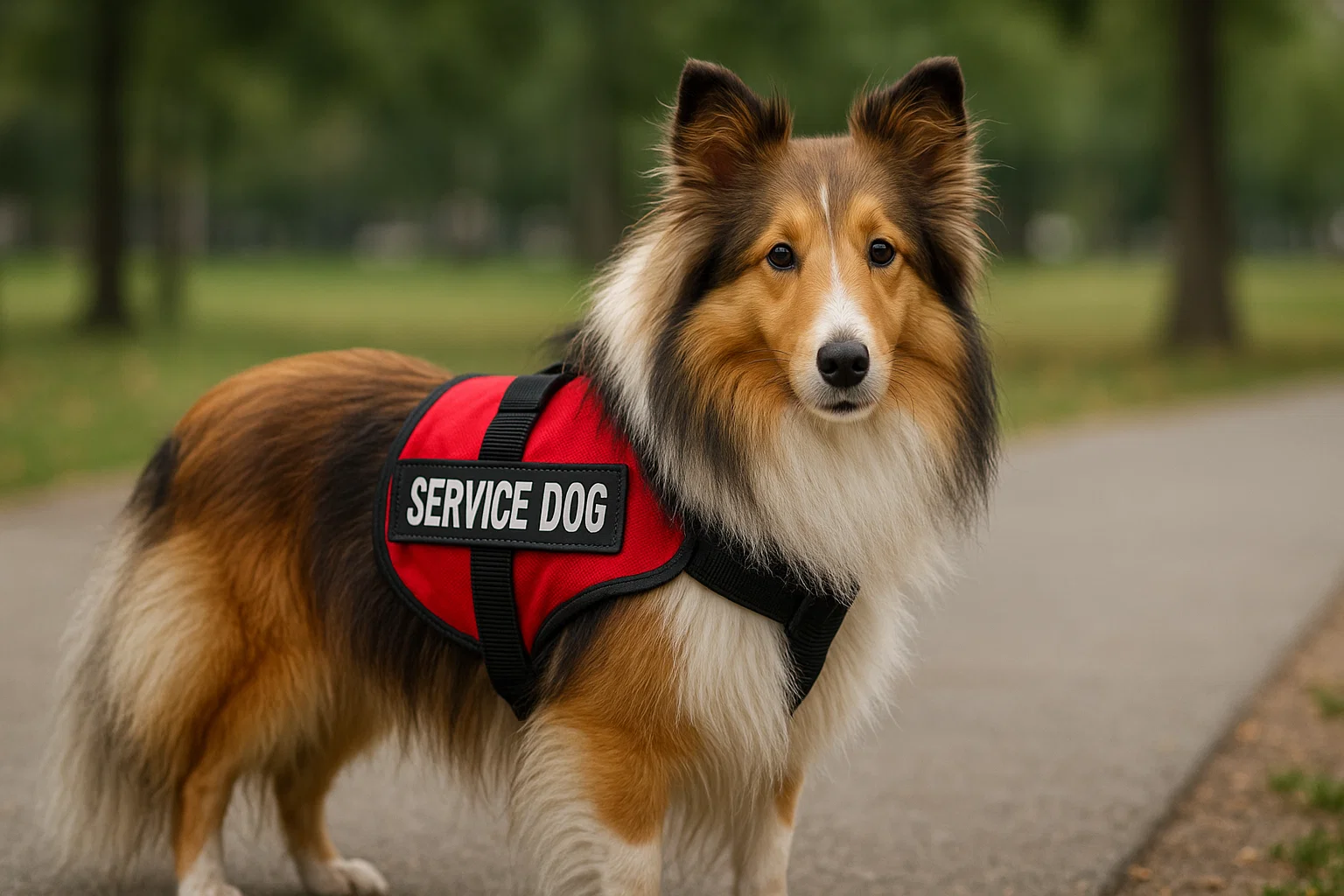Shetland Sheepdog as a Service Dog

Shetland Sheepdogs, often referred to as Shelties, are a highly intelligent and energetic breed known for their herding capabilities and remarkable trainability. As potential service dogs, Shelties can excel in specific roles, enhancing the quality of life for those in need due to their versatility and agility. However, considerations must be made regarding their suitability for particular tasks based on their physical attributes, temperament, and health predispositions.
Shetland Sheepdog Overview
The Shetland Sheepdog originates from the Shetland Islands, a group of islands north of Scotland, where their skills in herding sheep were valued due to the rugged terrain and challenging climate. This small to medium-sized breed is known for its intelligence, loyalty, and lively nature, making them popular companions and, potentially, service animals.
Physical Characteristics
Shetland Sheepdogs are characterized by their graceful and agile appearance. They boast a well-proportioned body that contributes to their agility and endurance, which are key traits for any service dog. Weighing between 15–25 pounds and standing 13–16 inches tall, they offer physical advantages:
- Size and Weight Considerations:
- Pros: Their medium size allows them to navigate through crowded or tight spaces more easily than larger breeds. This makes them ideal for tasks in environments where larger dogs may not be practical.
- Cons: Their smaller size may not be suitable for all types of service work, such as physical support or mobility assistance, where a larger, stronger breed might be necessary.
- Strength and Endurance:
- Shelties might not have the raw strength of larger breeds, but their endurance and energy are exceptional. They can maintain activity over long periods, beneficial in roles that require sustained physical or mental activity.
- Coat and Grooming:
- Their double coat, while attractive, requires regular grooming to prevent matting and skin issues. This can be a consideration for handlers who may not be able to maintain frequent grooming.
Temperament and Attitude
Shetland Sheepdogs are renowned for their excellent temperaments, characterized by keen intelligence, alertness, and an eagerness to please. These traits make them capable and reliable learners, particularly valuable in service work that requires quick adaptability and focus.
- Public and Stress Environment Adaptability:
- Their herding background equips them with a natural instinct to remain focused and composed, even in high-pressure situations, which is essential for service animals.
- Their alert nature makes them vigilant watchdogs, but could also manifest as shyness or wariness towards strangers. Socialization and training are crucial to manage or mitigate unwanted fearfulness or reactivity in public.
- Behavioral Suitability for Service Work:
- Friendly and loyal, Shelties form strong bonds with their handlers, fostering trust essential for successful service partnerships.
- They are typically gentle and get along well with families, making them suitable for services involving children or in-home assistance.
Types of Service Work
While not universally suited for all types of service work, Shetland Sheepdogs have specific roles where they can excel:
- Medical Alert:
- Their sharp senses and attentiveness can be harnessed in detecting medical conditions, such as seizures or low blood sugar in diabetics, providing timely alerts to their handlers.
- Psychiatric Service:
- With their strong emotional intuition, Shelties can be trained to provide comfort and support for individuals with psychiatric conditions, alleviating crises through tactile stimulation or interrupting harmful behavior.
- Emotional Support:
- While not classified as service dogs under the ADA, their companionship and responsiveness can provide significant emotional support to individuals in need.
However, they might not be the best candidates for:
- Mobility Assistance:
- Due to their size, they are less equipped to perform tasks involving physical support or pulling, especially for individuals requiring substantial mechanical aid.
Health Considerations
Shetland Sheepdogs, like all breeds, have specific health issues that may impact their effectiveness and longevity as service animals:
- Genetic Health Concerns:
- Conditions such as hip dysplasia, epilepsy, and Collie Eye Anomaly (CEA) are seen in this breed, potentially affecting their long-term functional soundness as service partners.
- Regular health screenings and responsible breeding practices are essential to mitigate these risks.
- Diet and Exercise Needs:
- Shelties require balanced nutrition and regular exercise to maintain optimal health and energy levels. Obesity can lead to exacerbating joint and heart conditions, detracting from their service capabilities.
Training and Suitability
Shetland Sheepdogs are highly trainable, making them excellent candidates for certain types of service work. Their intelligence and eagerness to learn are tremendous assets:
- Trainability Attributes:
- They quickly pick up complex commands and tasks, a testament to their cognitive abilities and responsiveness.
- Motivation through positive reinforcement methods is highly effective, as Shelties thrive on praise and rewards.
- Independence and Drive:
- While they are generally cooperative, their natural herding instinct can sometimes lead to independent thinking. This trait requires experienced handling to channel appropriately through consistent training and structured engagement.
- Training Challenges:
- Their sensitivity can result in stress if exposed to harsh training methods, necessitating a gentle, patient approach to training.
Summary of Shetland Sheepdog
In summary, Shetland Sheepdogs hold potential as remarkable service dogs, excelling in certain domains due to their intelligence, agility, and devotion. Below is a summary of their strengths and ideal service roles:
- Strengths:
- Highly intelligent and trainable
- Energetic and agile, with excellent endurance
- Loyal and strong bonding with handlers
- Adaptable in public settings with proper training
- Weaknesses:
- Lack of physical strength for heavy tasks
- Prone to specific breed-related health issues
- Requires regular grooming and mental stimulation
- Ideal Service Roles:
- Medical Alert
- Psychiatric and Emotional Support
- Therapy Services
The Shetland Sheepdog, with the appropriate training and environmental conditions, can be a valuable service dog for individuals requiring sharp, alert, and responsive canine support. While not universally suited to all service tasks, their unique traits make them indispensable partners for specific roles.











